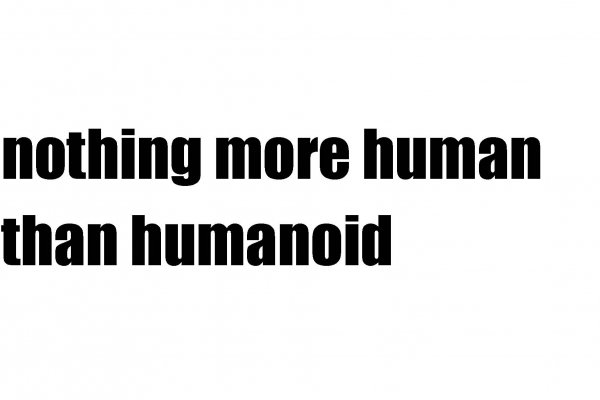Programm 2021
Laufzeit:
Eröffnung:
Termine:
Installationen:

„The real question is not whether machines can think, but whether people do."
[B.F. Skinner]
Humans will probably become different - networked and genetically transformed, surrounded by virtual realities and autonomous robots. In the process, we will be remaking ourselves at an ever-increasing rate. The boundaries are becoming increasingly fluid. This not only heralds something new, but at the same time the return of something ancient: the golems, Frankensteins, humunculi, supermen, zombies, automatons and androids. Frankenstein figures as a common denominator for the modern archetype of a replicated human being. As a symbol of artificial creatures, he populates ancient myths, magic, alchemy, and art, and reappears in a new guise in virtual media imagery, robotics, and genetic research. "Frankenstein reveals the problematic and endangered nature of the human being, who in his 'Herausgefallensein' [having fallen out] (out of creation) vacillates between hubris and despair." (Norbert Borrmann) There is nothing surprising about this interest in recreating oneself, which has existed at all times and in all cultures, since man has carried something artificial in himself from the beginning, has fallen out of the organic context of creation.
"One day we may have to worry about an omnipotent machine intelligence. But first we'll have to worry about giving machines responsibility for decisions they lack the intelligence to make," John Kleinberg points out 200 years later. For the first time in history, we are enabling AI-powered technologies to act "autonomously." Technical devices thus become "subjects" that ruthlessly invade our privacy. This subjectification raises the question of whether machines should be allowed to make ethical decisions. Unlike scientific knowledge, moral decisions cannot be objectified without reservation. Richard David Precht emphasizes: "Moral dilemmas cannot be solved quasi-objectively by millions of online surveys on the sum of the largest collection of similar judgments. Quantity is never identical with moral quality. Morality without subjectivity is no morality, and subjectivity without morality is no subjectivity. Moral judgments do not consist only of results or even 'solutions', but the path, the act of decision, is itself of paramount importance. Machine ethics demands that machines should not themselves be 'ethically' programmed, i.e. should not make decisions judging humans. Dealing ethically with machines is the opposite of programming them 'ethically'."
"Could it be that humanoids are, or one day will be, superior to their creators?" asks Gisela Schmalz today. "Will a human copy outperform the original that created it? Is the human so smart and stupid at the same time to bring something into the world that can assist them, but also dominate, manipulate or replace them? Will robotics save a weakening humanity, or is the robot-developing human playing a dangerous game against themselves? Will artificial creatures one day give birth to each other and exorcise the human condition from humans?"
The modification and perfection of bodies has now made it possible to change the blueprint of humans almost at will. Human enhancement, as Elon Musk intends with "Neuralink," shows what a predicament humans have got themselves into with this form of progress. But what makes a machine a machine is not so much its "material basis" as its striving for "non-reflective repeatability" (Georg Trogemann). What is needed as a countermeasure on the part of society? What must a "digital code" contain, what do "robotic laws" stipulate today? What ethical values actually still define us as "human"?
nothing more human than humanoid negotiates the question of whether robots can or are allowed to act morally on their own and thus aims at the necessity of contemporary ethics. Technologies as man-made products always include values in themselves and thus call for a moral evaluation. This presupposes having an idea of what a human being is, what distinguishes a human being. What is important is the transformation towards a critical posthumanism away from a deterministic dualism that allows for the complexity of systems and makes visible the entanglement of human and non-human actors. Given the ubiquity of algorithms, increasing use of machine learning and other automated processes, we are urged to claim our say even more forcefully, Gisela Schmalz appeals:
"Understand that your independence is up for grabs! Demand technologies that liberate you instead of bringing you into line! Prove your free will!"
Used Literature:
Isaac Asimov, Runaround, 1942
Norbert Borrmann, Frankenstein und die Zukunft des künstlichen Menschen, 2001
David Easley/John Kleinberg, Networks, Crowds, and Markets: Reasoning About a Highly Connected World, 2010
Julien Offray de La Mettrie, L’Homme-Machine, 1748 (dt. Der Mensch eine Maschine, 1965)
Janina Loh, https://berlinergazette.de/kuenstliche-intelligenz-kapitalismus-transhumanismus, 2020
Janina Loh, https://www.freitag.de/autoren/ulrike-baureithel/rudimentaere-moral, 2019
Richard David Precht, Künstliche Intelligenz und der Sinn des Lebens. Ein Essay, 2020
Daniel Rebhorn, Digitalismus. Die Utopie einer neuen Gesellschaftsform in Zeiten der Digitalisierung, 2019
Gisela Schmalz, HUMAN/HUMANOID/NEVER PARANOID, 2021
Gisela Schmalz, Mein fremder Wille, 2020
Georg Trogemann/Jochen Viehoff, Code Art – Eine elementare Einführung in die Programmierung als künstlerische Praktik, 2005
